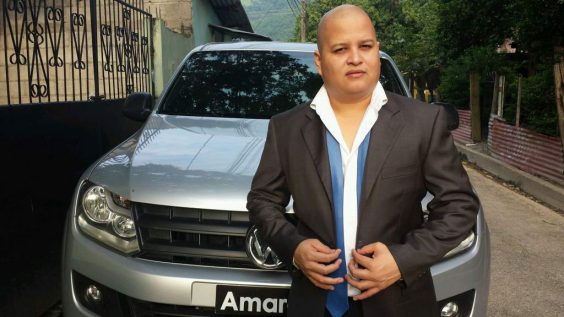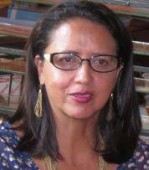Journalists Under Attack in Honduras While Impunity Invades Everything
by Dina Meza / February 24, 2017 / No comments

Journalist Igor Padilla was shot and killed on January 17, 2017. Photo by El Heraldo.
Journalist Igor Padilla’s death serves as a case study for the rising tensions and cases of impunity as election year begins in Honduras.
Crimes against journalists, social commentators and communication workers in general have become the norm in the country of Honduras. When they kill someone in this region, the crime lasts one or two weeks in the media before leaving the public agenda and consciousness. Parallel to this, operators of justice initially act under media pressure and say that they are making great efforts to bring the perpetrators to justice.

- Honduras has one of the world’s highest murder rates. It is also one of the most dangerous countries to practice journalism, ranking 129th out of 180 in the 2014 World Press Freedom Index. Journalists are regularly threatened, attacked, and killed for their work. The Honduran government fails to punish those who use violence against reporters, essentially granting them impunity. This space will be dedicated to examining the lack of protection for Honduran journalists exercising their profession. Topics will include the use of state-sponsored advertising as a mechanism to reward or punish publications, and censorship and self-censorship as hindrances to democratic progress.

- Born in Cofradía, Honduras, Dina Meza has been recognized by PEN International, Amnesty International, Index on Censorship and Reporters without Borders for her work as a journalist and human rights advocate. Currently, Dina is the driving force behind the creation of Honduras PEN Centre. In 2013, she wrote “Reign of Terror,” an in-depth report on threats to Honduran journalists for Index on Censorship’s magazine. In 2014, she was named one of Reporters Without Borders’ “100 Heroes and Heroines of Information.”
The recent crime against the journalist Igor Padilla, from the TV channel HCH, re-opened the discussion of assassinations of social commentators. This incident was so appalling that it forced the issuing of statements by international organizations, amongst them the Office of the High Commissioner for Human Rights in Honduras, UNESCO, and the Inter American Press Association (IAPA), demanding a prompt investigation to bring those responsible to justice.
Since the coup in Honduras in June 2009, crimes against civilians in this region have increased, and the same increase has happened with impunity. Since last year, the Comisionado Nacional de Derechos Humanos (National Commission for Human Rights CONADEH), has documented 64 crimes: three against women and 61 against men, 65 including Igor Padilla. Although the figures differ, the crimes all share a lack of investigation. Ideally, we would be able to dismantle impunity in investigations, but to journalists and society as whole this seems like a dream to be cherished.
A report by the Inter American Commission on Human Rights (ICHR), published in February 2016 showed that Honduras had the highest number of crimes against journalists in 2015. Considering it is a small country of 8.5 million inhabitants compared to nations such as Mexico with 126 million, Brazil with 208 million, and Columbia with around 50 million inhabitants, Honduras has established itself as the place where the most journalists are killed. The lack of government response in correlation to these crimes puts impunity in these cases of injustice at 96 percent.
Padilla’s death revealed how the nation’s security system, which the government presents as though it is eighth wonder of the world, is only superficial. This system, made up of many security forces, claims to have already solved Padilla’s case. But the lack of transparency in investigations and collective mistrust in these repressive machines makes the people think it is a facade to quiet voices of protest.
The case also made clear the Honduran State’s plan to sign international agreements without intentions of fulfilling them, such as is the case with the Universal Periodic Review, UPR-2015, in Geneva, Switzerland, where a large delegation from the Honduran Government went before the UN Security Council.
The statement from the UN Security Council issued 152 recommendations for the Honduran State, amongst them 21 related to journalists and freedom of expression, indicating that they must “take the necessary measures to improve the safety of journalists and human rights defenders, and carry out independent and credible investigations into the assassinations of journalists and threats that occurred in 2010, and bring to justice the perpetrators of these reprehensible acts.”
An analysis by attorney Joaquín Mejía, who is very diligent and carries out conclusive investigations on various aspects of human rights, indicated that there is an institutional fragmentation in the country to the extent that 15 new military and police units have been created without any resulting protection for civilians. If we look at the enormous budget for these institutions compared to the results on the ground, it is clear that the people’s money is being spent on security and that these forces do not live up to their expectations against criminality.
The State has also created another structure called the Special Prosecutor for Crimes Against Life and, within that, the Unit for Investigation of High Impact Crimes, charged with investigating the murders of journalists. To date, the Unit has not published any reports and nothing is known about the Unit’s activities.
Because 2017 is an election year in Honduras, the situation is even worse this year than in the past. It becomes even worse still if you add in the reelection of current President Juan Orlando Hernández and the package of reforms to the Penal Code that he is pushing for that will include crimes aimed at repressing social protest and creating a confusing figure of terrorism. The code smells of corruption and, according to the civil society organizations joined together in Articulación 611, is aimed at those who protest and oppose his reelection.
Hernández used the crime against the journalist Igor Padilla to put pressure on these reforms by encouraging fear and pushing the image of the security forces he has created. He then urged Parliament to approve his authoritarian reforms.
There is a weapon more powerful than policy in this climate of violence: It is unity against arbitrariness in cases of injustice. This can only be achieved through hard work, commitment and the relinquishing of prominence in civil society. Otherwise, the abuse of power will continue. What will we decide to do?




